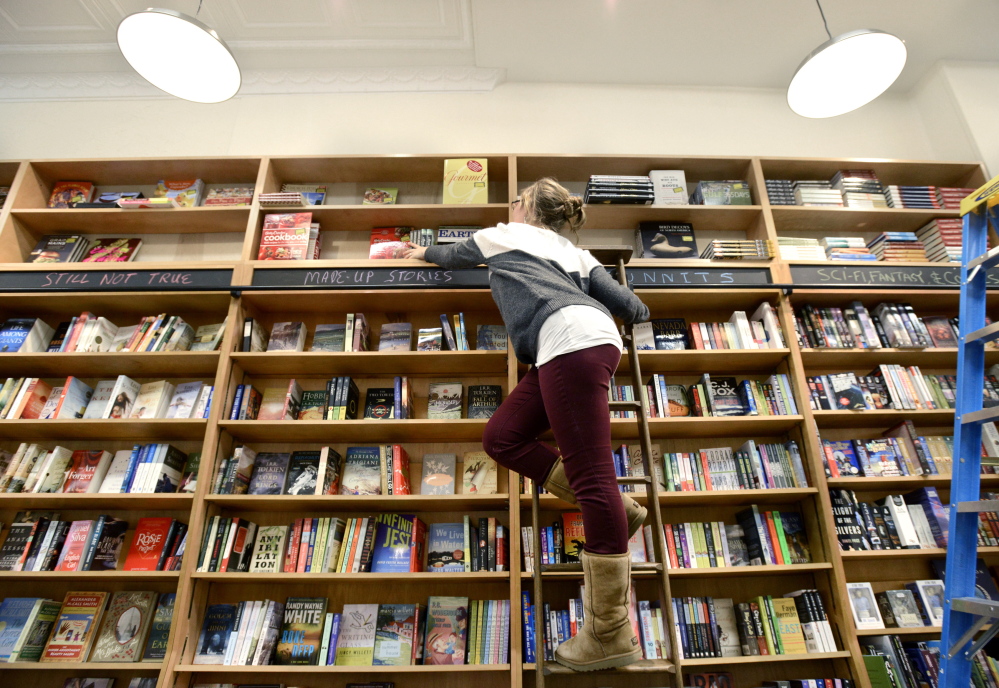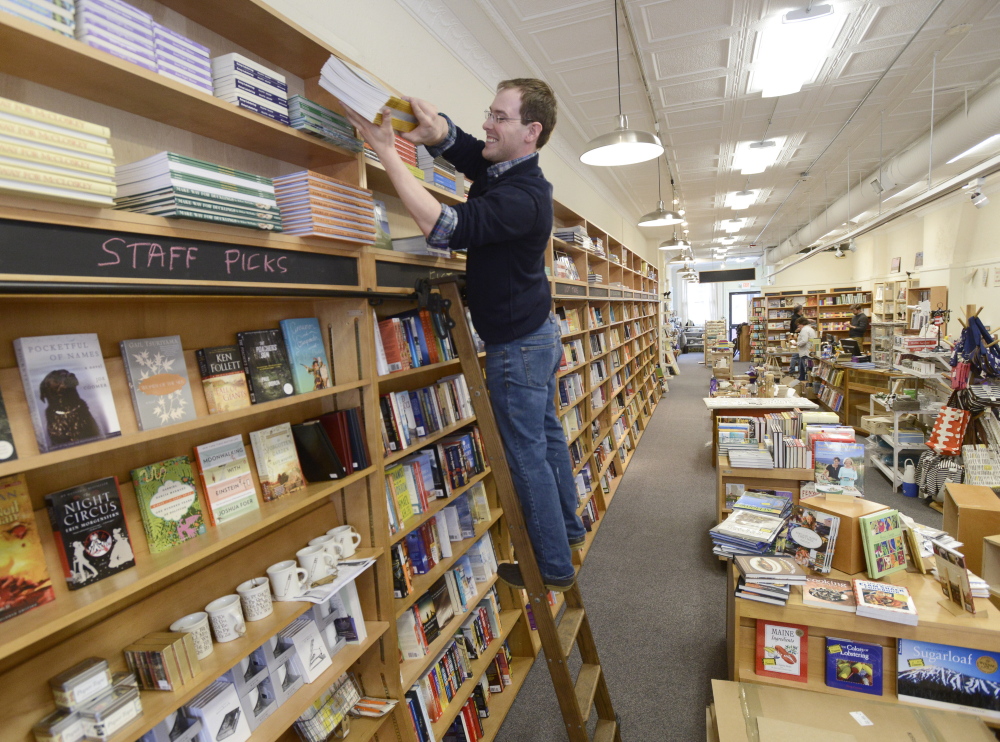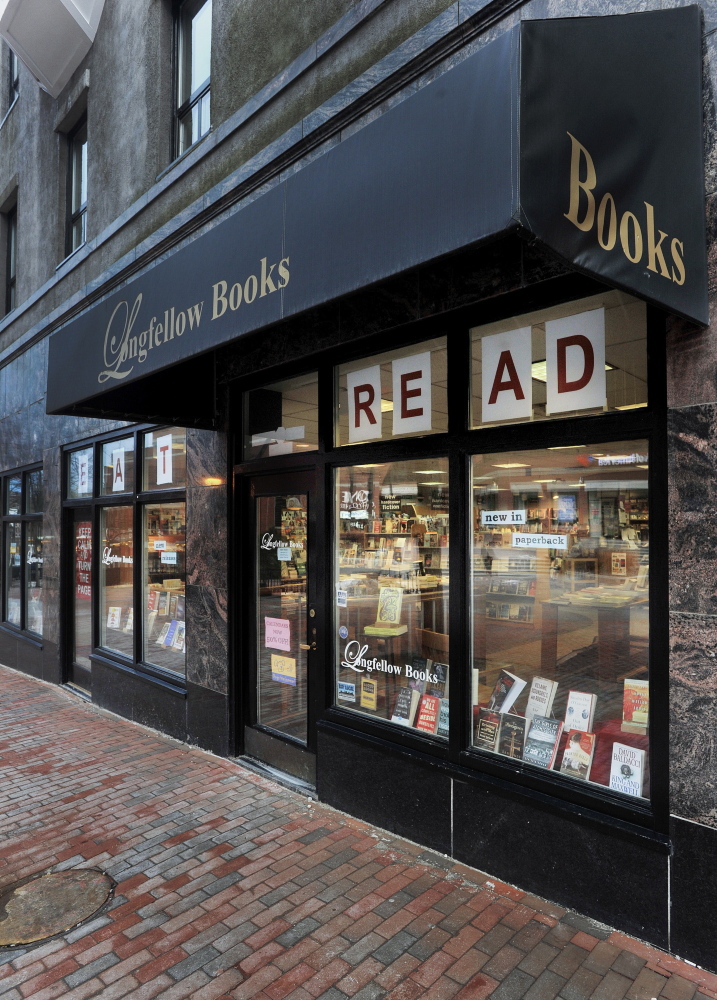When the paper came off the windows Friday at 49 Exchange St., revealing to passers-by the new Sherman’s Books and Stationery, the response was immediate.
“Within the first 15 minutes, 10 people tried to open the doors,” Tori Curtis, a book and merchandise buyer for Sherman’s, said Monday. “It was very encouraging.”
Sherman’s will officially open the store, its first in Maine’s largest city and its fifth in the state, on Tuesday.
It joins Longfellow Books in Monument Square as only the second bookstore on the Portland peninsula that sells new books. It will be the first store on Exchange Street devoted to new books since Books Etc. closed in 2009, a victim of the recession and competition from online book sales, the owner said at the time.
Booksellers say Portland is ready to be a two-bookstore city again, and national trends suggest that Sherman’s expansion into Portland is local evidence of a resurgence that independent bookstores are having around the country despite the rise of digital books and powerful competitors such as Amazon.com.
“The popular narrative that gets talked about, that bookstores are up against a wall and are like some endangered species, is simply not true,” said Oren Teicher, CEO of the American Booksellers Association. “What’s going on with Sherman’s is one of hundreds of examples around the country that a real resurgence is taking place among independent bookstores.”
Jeff Curtis, who owns Sherman’s, wasn’t looking to expand into Portland. But when his daughter, Tori, mentioned that Edgecomb Potters had moved out of its coveted location on Exchange Street last fall and asked him to consider it for a new store, he agreed to have a look at the space.
“I thought I was humoring her,” Curtis said Monday between last-minute preparations at the store.
Curtis said he thinks Portland is ready for another bookstore and he is confident that Sherman’s will thrive in the Old Port.
Sherman’s has a long history in Maine. It was founded in Bar Harbor in 1886. Curtis’ parents bought it from the Shermans in the early 1960s. Curtis left his law practice in 1989 to open a store in Boothbay Harbor, followed by another in Freeport in 1998 and a third store in Camden in 2004. In 2006, he bought out his mother’s business and added the Bar Harbor location.
All Sherman’s bookstores intermingle gifts with books. Curtis called it the “model bookstore for the future.”
Josh Christie, the Portland store’s manager, agreed. Christie, a 10-year veteran of Sherman’s who began working at the Camden store when he was in college, said the company’s business model of intermingling gifts with books, and being nimble and quick to respond to the community, is one of its greatest strengths.
“The bookstore of the future is one willing to adapt,” Christie said. “Change is hard, but some would like to go down with the ship rather than patch the hole.” While some bookstores have tried to sell other items, like gifts, it often can feel artificial, “whereas it’s been baked into the Sherman’s model for nearly a century,” he said.
The number of bookstores across the country has been growing over the past several years, said Teicher of the booksellers association. The association now has 1,632 member companies, including Sherman’s, that operate 1,971 bookstores, according to its membership data.
After the number of bookstores peaked in the mid-1990s, the number of stores closing outpaced new ones opening, Teicher said. But that trend has reversed in the past four years.
Since 2009, the low point, the number of association members has increased 16.5 percent, from 1,401 to 1,632, while the number of bookstores has increased 19.3 percent, from 1,651 to 1,971.
The rebound can’t be explained by a single factor, Teicher said. Several developments over the past few years have contributed to the resurgence of independent bookstores:
• A growing “buy local” movement throughout the country.
• Bookstore owners gaining more access to sophisticated technology that helps them compete with large, corporate competitors.
• Publishers realizing they need brick-and-mortar bookstores to fuel book sales and becoming willing to explore new business relationships with those stores.
• An influx of entrepreneurial store owners who aren’t afraid to try new things.
Also helping that resurgence was the bankruptcy of Borders, which closed 600 stores throughout the country. Books-A-Million bought Borders’ South Portland location at the Maine Mall and still operates it.
Curtis said Borders’ bankruptcy in 2011 opened people’s eyes to the challenges that bookstores faced and helped fuel the buy-local movement. “If even Borders is vulnerable, maybe we should be paying attention,” he said.
Independent bookstores have an advantage over the chains such as Barnes & Noble and Borders, Teicher said.
“It used to be, in retail, the presumption was bigger is better,” Teicher said. “In today’s world, where things change as rapidly as they do, being a little smaller and being able to adapt and change is actually an asset, not a liability. We find our size works to our advantage.”
Chris Bowe, co-owner of Longfellow Books, said he welcomes Sherman’s to town. More independent bookstores is usually a good thing, he said. It keeps people downtown and “adds to the cultural vibrancy of the town.”
“It’s one of those businesses where more can be better – not too much more, but just the sense that Portland is a book town and the business is alive and thriving and books are still relevant in people’s lives. It ratchets up the conversation,” Bowe said.
Longfellow customers said Monday that they would visit Sherman’s.
Michael Gatlin of Portland was at Longfellow, shopping for books for his young son. Gatlin has been a customer of the store for about a year, but said he would give a new bookstore a chance.
“I don’t have an allegiance to any particular brand or company. I like Longfellow Books. I like their style. I like the atmosphere. They have a lot of good stuff,” Gatlin said. “I’d definitely go in (Sherman’s), but if they have the same inventory, I’d stick with Longfellow.”
Tamara Doyle, 25, a Peaks Island resident, browsed Longfellow Books’ used fiction section on Monday. A self-described “bookstore fan,” Doyle had walked past Sherman’s new store earlier in the day and was excited by the prospect of a new bookstore in town, especially one closer to the Casco Bay ferry terminal. She thinks Portland should have no problem supporting two bookstores.
“Exchange Street is a little more touristy, so it could get more business in that regard,” Doyle said of Sherman’s. “But Longfellow has a dedicated following to sustain itself. I don’t think it will hurt Longfellow.”
Curtis and Bowe agreed.
Curtis said the foot traffic patterns on Exchange Street and Monument Square, though separated by a walk of only a few minutes, are different enough that both stores will be able to thrive.
“This is a big town to have only one bookstore,” Curtis said. “Different people walk around the Old Port and don’t necessarily make it to Monument Square, and people leaving their offices (around Monument Square) to get books don’t often walk to the Old Port.”
Whit Richardson can be contacted at 791-6463 or at:
wrichardson@pressherald.com
Twitter: whit_richardson
Send questions/comments to the editors.





Success. Please wait for the page to reload. If the page does not reload within 5 seconds, please refresh the page.
Enter your email and password to access comments.
Hi, to comment on stories you must . This profile is in addition to your subscription and website login.
Already have a commenting profile? .
Invalid username/password.
Please check your email to confirm and complete your registration.
Only subscribers are eligible to post comments. Please subscribe or login first for digital access. Here’s why.
Use the form below to reset your password. When you've submitted your account email, we will send an email with a reset code.